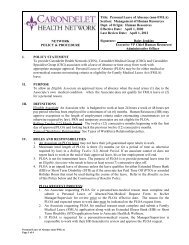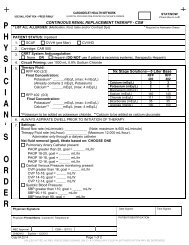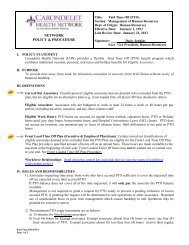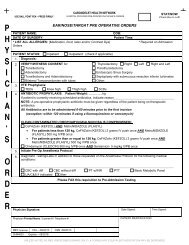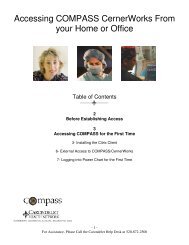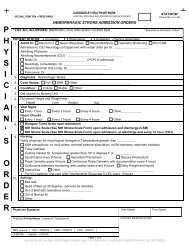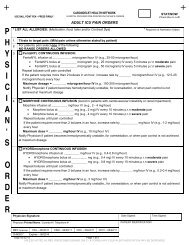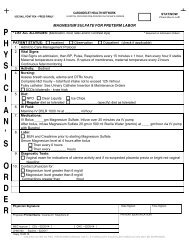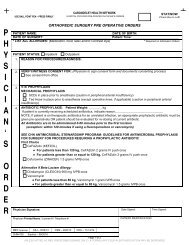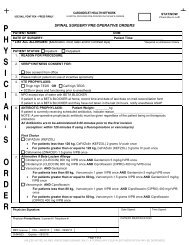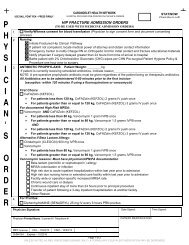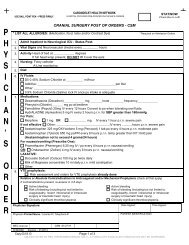HeartSaver CT Brochure - Carondelet.org
HeartSaver CT Brochure - Carondelet.org
HeartSaver CT Brochure - Carondelet.org
You also want an ePaper? Increase the reach of your titles
YUMPU automatically turns print PDFs into web optimized ePapers that Google loves.
<strong>HeartSaver</strong> <strong>CT</strong> SMdo you haveHeartDisease?Are You Sure?HEART & VASCULARINSTITUTE
<strong>HeartSaver</strong> <strong>CT</strong> can uncover heart disease in a few minutes,and maybe years before you have a symptom.
FREQUENTLY ASKED QUESTIONSQ. What Is It Like Getting A <strong>HeartSaver</strong> <strong>CT</strong>?Q. What is <strong>HeartSaver</strong> <strong>CT</strong>?A. <strong>HeartSaver</strong> <strong>CT</strong> is a breakthrough technology that canuncover coronary artery disease at its earliest stagesalmost instantly. It works by providing images of thecoronary arteries and the calcium that has developedwithin them. Calcium deposits are a significant clueto the presence of atherosclerosis, the leading causeof coronary artery disease. While traditional riskfactortests suggest a probability of atherosclerosis,they cannot determine whether the disease is, in fact,present. Thus, <strong>HeartSaver</strong> <strong>CT</strong> is a good additionto traditional methods of coronary artery diseaserisk assessment.A. Getting a <strong>HeartSaver</strong> <strong>CT</strong> is painless, non-invasive(meaning no needles) and takes very little time.The scan itself can be completed in less than sevenminutes. Because the scanner is open-faced, there is no“claustrophobic” experience. EKG wires are attachedto the patient, who is then asked to lie on a paddedtable that moves slowly through the scanner. At onepoint, the patient is asked to briefly hold his or herbreath while the scanner takes images. The <strong>HeartSaver</strong><strong>CT</strong> technologist talks to the patient throughout theprocedure, explaining everything as it happens.The risk with <strong>HeartSaver</strong> <strong>CT</strong> isvirtually non-existent. The X-raydose for each study is equivalent toa series of abdominal X-rays.Q. What Makes This Different FromTraditional Tests?A. Traditional risk-factor tests do not always predictcoronary artery disease. For example, it’s been shownthat a significant number of patients with elevatedcholesterol levels will never develop a coronary event.Yet, at the same time, many with normal cholesterollevels do develop significant disease. Because atreadmill test will detect only major flow-obstructinglesions, it is not appropriate for preventative testing orfor screening patients who do not have symptoms.Q. Is A Physician’s Prescription RequiredTo Get A <strong>HeartSaver</strong> <strong>CT</strong>?A. Yes, you must receive a prescription from your PrimaryCare Physician or Cardiologist.Q. Are There Any Special Pre-testQ.Instructions?A. There are no special pre-test instructions. You may eator drink normally prior to the scan. Women may bemore comfortable wearing slacks or a skirt and blouseto make it easier to place EKG leads.
<strong>HeartSaver</strong> <strong>CT</strong>From <strong>Carondelet</strong> Heart & Vascular InstituteIt’s Fast, It’s Painless,It Saves LivesThe <strong>HeartSaver</strong> <strong>CT</strong> SM can do two things: uncoverheart disease at its earliest stages, and eliminateexcuses for not having the test performed.“I don’t have time.”Q. How Much Does The <strong>HeartSaver</strong> <strong>CT</strong>Scan Cost?A. The cost of the <strong>HeartSaver</strong> <strong>CT</strong> scan is $99.Payment is required at the time of the scanand can be made with cash, personal check,money order, or credit card, including Visa andMasterCard.Q. Who Should Have This Test?A. This test is for males over 40 and females over50 with a known risk factor for developingcoronary artery disease. The following criteriaare used for referral for this test:• Family history of heart disease• High cholesterol• High blood pressureQ. Where is the Test Performed?A. <strong>HeartSaver</strong> <strong>CT</strong> is a service provided by the<strong>Carondelet</strong> Heart & Vascular Institute, locatedat 4888 N. Stone Ave., Tucson, AZ. A mapis provided to all patients scheduled for anexam.<strong>HeartSaver</strong> <strong>CT</strong> requires only about 30-45minutes of your time. In most cases, the procedureitself takes about seven minutes.“I’m afraid of needles.”There are no needles with the <strong>HeartSaver</strong> <strong>CT</strong>.There are no catheters, no injections, and no dyes.The procedure is painless and non-invasive.“I feel fine.”In its earliest and most treatable stages, coronaryartery disease rarely reveals itself throughsymptoms. For many people, a heart attack is thefirst clue of any heart problems.“I’ve had stress tests.”Exercise stress tests can uncover certain problems,especially if coronary artery disease is so advancedthat danger is imminent. Oftentimes, however,stress tests miss the problem and patients goundiagnosed. The <strong>HeartSaver</strong> <strong>CT</strong> provides crystalclearimages that can identify mild to severecoronary artery disease.Q. How Do You Schedule An Exam?A. To schedule a <strong>HeartSaver</strong> <strong>CT</strong>, simply call520-696-2314.
Plan your <strong>HeartSaver</strong> <strong>CT</strong>.Call 520.696.2314 for a powerfullook at your heart.4888 N. Stone Ave.Tucson, AZ 85704520.696.2328 (main number)www.carondelet.<strong>org</strong>/chvi



